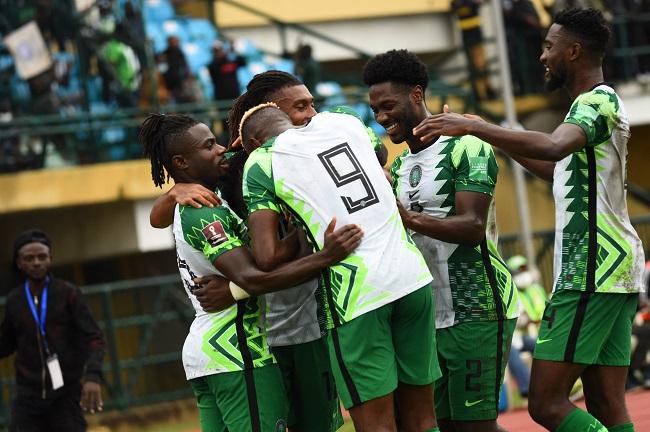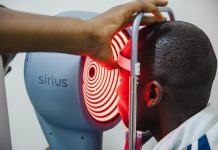Africa-Press – Liberia. Line-ups Nigeria Formation: 1-4-4-2 Starting Eleven: 23 Maduka Okoye, – 2 Ola Aina, 6 Leon Balogun, 5 William Troost-Ekong (Captain), 3 Jamilu Collins, – 18 Alex Iwobi (A. Shehu 84’), 4 Wilfred Ndidi, 10 Joe Aribo, 15 Moses Simon (S. Kalu 78’), – 14 Kelechi Iheanacho (A, Musa 85’), 9 Victor Osimhen (P. Onuachu 78’)
Substitutes: 12 Abdullahi Shehu, 7 Ahmed Musa, 13 Bonke Innocent, 11 Chidera Ejuke, 20 Chidozie Awaziem, 16 Daniel Akpeyi,1 Francis Uzoho, 22 Kenneth Omeruo, 8 Oghenekaro Etebo, 19 Paul Onuachu, 17 Samuel Kalu, 21 Tyronne Ebuehi
Liberia Formation: 1-4-1-4-1 Starting Eleven: 23 Ashley Williams, 5 Jeremy Saygbe, 2 Marcus Macauley, 7 Mohamed Soumaoro, 19 Oscar Dorley, 12 Prince Balde, 24 Sampson Dweh, 6 Allen Njie, 21 Terrence Tisdell, 11 Ayouba Kosiah, 9 Kpah Sherman
Substitutes: 8 Abu Kamara, 4 Alvin McConnel, 13 Carlos Williams, 15 Daniel Paye, 22 David Tweh, 3 Dennis Teah, 17 Justin Salmon, 10 Mohammed Kamara, 1 Morlik Keita, 18 Peter Wilson, 16 Tommy Songo, 20 Van Dave Harmon
The Super Eagle’s 2022 World Cup qualifying campaign got off to a good start as they beat Liberia 2-0. The match, which took place at the Teslim Balogun Stadium in Lagos, saw two intelligent goals from Kelechi Iheanacho, both of which were assisted by Alex Iwobi. Tactics System and Personnel Changes
Yesterday, Gernot Rohr went with a 1-4-4-2 formation, a formation that Nigeria is very familiar with. It is also a formation that is being used to take advantage of Iheanacho’s form with his club from the previous season and with his current form with the Super Eagles.
Ndidi and Aribo were able to form a quality and balanced pairing in central midfield. In the full back positions, the uncommon combination of Collins and Aina was used. Open Play Going forward, Nigeria went with their usual mixture of a direct and indirect style of play.
When transitioning out of their defensive third, the Super Eagles would usually look for the direct ball to their strikers and if that could not be played the Super Eagles would try to play out of the back through the wide areas, using the fullbacks and the wide midfielder.
They would also try to play through Ndidi whenever possible. Iwobi who usually starts from the left midfield, was deployed from right to start the match. This was quickly changed however as the team realised it was more effective for him to play from his usual left midfield position.
Defensively, the Super Eagles played a mid-block, but due to the opposition and their supposed superiority over them, they played a slightly higher line than normal. Set-Pieces Set pieces were a big theme for Nigeria and their training for the said set pieces proved to be crucial during the match.
Most of the corner kicks were taken by Kelechi Iheanacho, and while the team were unable to connect from headers, a nicely worked training ground routine between himself and Alex Iwobi led to the opening goal of the match in the 22nd minute. Similar can be said for one of the throw-ins that Nigeria had in the second half. They opted for a long throw which Iwobi flicked on for Iheanacho to put away. Substitutions
All of the substitutions seemed liked they were mostly to rest players on the pitch and provide minutes to the players off of it. It could also be said that more attacking players (Onuachu, Kalu and Musa) were introduced to keep the pressure on Liberia to help maintain the lead, but the level of threat from attack seemed to reduce with each substitution. Beyond that it is difficult to find much tactical reasoning for the substitutions.
Offensive and Defensive Positioning Osimhen played as the furthest forward striker, with Iheanacho slightly behind him. Whenever Iheanacho moved high up the pitch, Iwobi would always come into the vacant space. This movement from both Iheanacho and Iwobi also created more space for Collins and gave him more freedom to attack and cross.
Aribo was given more licence to join the attack. Simon played more of a traditional winger role while Iwobi would come centrally or into the half space to try to create. Due to the lack of threat from opposition, the fullbacks were given more freedom to overlap and make attacking contributions in the final third.
It was also clear in yesterday’s match that the Super Eagles were told to get numbers into the box. Due to the level of the opposition, they felt they could take more players into the final third without risking too much at the back. On many occasion players like Aribo and Iwobi found themselves in front of goal alongside Iheanacho and Iwobi.
Defensively, Nigeria played with a slightly higher line than usual. Ndidi had the principal role of sitting in midfield and protecting the back four. Team Performance
Despite the Super Eagle winning 2-0, it felt more like a result that was brought upon by the gap in player quality between the two teams than a cohesive team performance.
Against a team that they are reasonably stronger than on paper, they were still unable to move the ball quickly enough and dictate play in a way that would result in goals from open play.
Also, at about the 75 minute mark, when Nigeria realised (or felt like) the game was sealed, they greatly reduced their intensity. They created much fewer chances and no longer looked to combine with each other as much. The substitutes were not able to show much in general because of this.
This being said, in the process of getting the two goals, the team showed a lot of confidence, and most of the players did not shy away from getting forward and taking on the opposition. Players like Iwobi, Aribo, and Moses Simon showed a lot of flair while the fullbacks, Collins and Aina were also not shy in taking on the opposition, with the latter even having an attempt at goal during the match.
Defensively, Nigeria put on a disciplined and matured performance and did not receive a single booking.Super Eagles Notable Individual Performances Kelechi Iheanacho
Iheanacho had an excellent match and was vital for Nigeria as he scored both of the team’s goals. The first was from a well worked corner between him and Alex Iwobi in the 22nd minute. While the opposition contributed by not bringing enough men to defend the both of them (one defender instead of two to make it a 2v2), Iheancho was smart enough to notice that the goalkeeper was out of position and fired a low driven shot into the near post.
His second goal was arguably more impressive as he brought the ball down on the half turn from a flicked on pass by Iwobi. He then placed ball into the far post with his weaker foot.
He also had the opportunity to score a third, but misplaced the header. Victor Osimhen He struggled to get into the match and seemed to mostly look to run on to the ball instead of to try to play with the team.
Alex Iwobi He had a very influential match, assisting two goals and creating several other opportunities for the team and himself. He showed again how much the team rely on his creativity. Joe Aribo
He had the freedom to get into more attacking positions, which is something that suits his style of play as he is a very technical player. Other than doing well with linking up with the other players on the team and being generally good in possession, he was able to get into some goal scoring positions, he just lacked the finishing.
What We Learned -Aribo has more to offer the team offensively -Perhaps Iheanacho is not on a purple patch and more consistent performances can be expected from him in the future. Line-ups Nigeria Formation: 1-4-4-2
Starting Eleven: 23 Maduka Okoye, – 2 Ola Aina, 6 Leon Balogun, 5 William Troost-Ekong (Captain), 3 Jamilu Collins, – 18 Alex Iwobi (A. Shehu 84’), 4 Wilfred Ndidi, 10 Joe Aribo, 15 Moses Simon (S. Kalu 78’), – 14 Kelechi Iheanacho (A, Musa 85’), 9 Victor Osimhen (P. Onuachu 78’)
Substitutes: 12 Abdullahi Shehu, 7 Ahmed Musa, 13 Bonke Innocent, 11 Chidera Ejuke, 20 Chidozie Awaziem, 16 Daniel Akpeyi,1 Francis Uzoho, 22 Kenneth Omeruo, 8 Oghenekaro Etebo, 19 Paul Onuachu, 17 Samuel Kalu, 21 Tyronne Ebuehi
Liberia Formation: 1-4-1-4-1 Starting Eleven: 23 Ashley Williams, 5 Jeremy Saygbe, 2 Marcus Macauley, 7 Mohamed Soumaoro, 19 Oscar Dorley, 12 Prince Balde, 24 Sampson Dweh, 6 Allen Njie, 21 Terrence Tisdell, 11 Ayouba Kosiah, 9 Kpah Sherman
Substitutes: 8 Abu Kamara, 4 Alvin McConnel, 13 Carlos Williams, 15 Daniel Paye, 22 David Tweh, 3 Dennis Teah, 17 Justin Salmon, 10 Mohammed Kamara, 1 Morlik Keita, 18 Peter Wilson, 16 Tommy Songo, 20 Van Dave Harmon
The Super Eagle’s 2022 World Cup qualifying campaign got off to a good start as they beat Liberia 2-0. The match, which took place at the Teslim Balogun Stadium in Lagos, saw two intelligent goals from Kelechi Iheanacho, both of which were assisted by Alex Iwobi. Tactics System and Personnel Changes
Yesterday, Gernot Rohr went with a 1-4-4-2 formation, a formation that Nigeria is very familiar with. It is also a formation that is being used to take advantage of Iheanacho’s form with his club from the previous season and with his current form with the Super Eagles.
Ndidi and Aribo were able to form a quality and balanced pairing in central midfield. In the full back positions, the uncommon combination of Collins and Aina was used. Open Play Going forward, Nigeria went with their usual mixture of a direct and indirect style of play.
When transitioning out of their defensive third, the Super Eagles would usually look for the direct ball to their strikers and if that could not be played the Super Eagles would try to play out of the back through the wide areas, using the fullbacks and the wide midfielder.
They would also try to play through Ndidi whenever possible. Iwobi who usually starts from the left midfield, was deployed from right to start the match. This was quickly changed however as the team realised it was more effective for him to play from his usual left midfield position.
Defensively, the Super Eagles played a mid-block, but due to the opposition and their supposed superiority over them, they played a slightly higher line than normal.Set-Pieces Set pieces were a big theme for Nigeria and their training for the said set pieces proved to be crucial during the match.
Most of the corner kicks were taken by Kelechi Iheanacho, and while the team were unable to connect from headers, a nicely worked training ground routine between himself and Alex Iwobi led to the opening goal of the match in the 22nd minute. Similar can be said for one of the throw-ins that Nigeria had in the second half. They opted for a long throw which Iwobi flicked on for Iheanacho to put away. Substitutions
All of the substitutions seemed liked they were mostly to rest players on the pitch and provide minutes to the players off of it. It could also be said that more attacking players (Onuachu, Kalu and Musa) were introduced to keep the pressure on Liberia to help maintain the lead, but the level of threat from attack seemed to reduce with each substitution. Beyond that it is difficult to find much tactical reasoning for the substitutions.
Offensive and Defensive Positioning Osimhen played as the furthest forward striker, with Iheanacho slightly behind him. Whenever Iheanacho moved high up the pitch, Iwobi would always come into the vacant space. This movement from both Iheanacho and Iwobi also created more space for Collins and gave him more freedom to attack and cross.
Aribo was given more licence to join the attack. Simon played more of a traditional winger role while Iwobi would come centrally or into the half space to try to create. Due to the lack of threat from opposition, the fullbacks were given more freedom to overlap and make attacking contributions in the final third.
It was also clear in yesterday’s match that the Super Eagles were told to get numbers into the box. Due to the level of the opposition, they felt they could take more players into the final third without risking too much at the back. On many occasion players like Aribo and Iwobi found themselves in front of goal alongside Iheanacho and Iwobi.
Defensively, Nigeria played with a slightly higher line than usual. Ndidi had the principal role of sitting in midfield and protecting the back four. Team Performance
Despite the Super Eagle winning 2-0, it felt more like a result that was brought upon by the gap in player quality between the two teams than a cohesive team performance.
Against a team that they are reasonably stronger than on paper, they were still unable to move the ball quickly enough and dictate play in a way that would result in goals from open play.
Also, at about the 75 minute mark, when Nigeria realised (or felt like) the game was sealed, they greatly reduced their intensity. They created much fewer chances and no longer looked to combine with each other as much. The substitutes were not able to show much in general because of this.
This being said, in the process of getting the two goals, the team showed a lot of confidence, and most of the players did not shy away from getting forward and taking on the opposition. Players like Iwobi, Aribo, and Moses Simon showed a lot of flair while the fullbacks, Collins and Aina were also not shy in taking on the opposition, with the latter even having an attempt at goal during the match.
Defensively, Nigeria put on a disciplined and matured performance and did not receive a single booking.Super Eagles Notable Individual Performances Kelechi Iheanacho
Iheanacho had an excellent match and was vital for Nigeria as he scored both of the team’s goals. The first was from a well worked corner between him and Alex Iwobi in the 22nd minute. While the opposition contributed by not bringing enough men to defend the both of them (one defender instead of two to make it a 2v2), Iheancho was smart enough to notice that the goalkeeper was out of position and fired a low driven shot into the near post.
His second goal was arguably more impressive as he brought the ball down on the half turn from a flicked on pass by Iwobi. He then placed ball into the far post with his weaker foot.
He also had the opportunity to score a third, but misplaced the header. Victor Osimhen He struggled to get into the match and seemed to mostly look to run on to the ball instead of to try to play with the team.
Alex Iwobi He had a very influential match, assisting two goals and creating several other opportunities for the team and himself. He showed again how much the team rely on his creativity. Joe Aribo
He had the freedom to get into more attacking positions, which is something that suits his style of play as he is a very technical player. Other than doing well with linking up with the other players on the team and being generally good in possession, he was able to get into some goal scoring positions, he just lacked the finishing.
What We Learned -Aribo has more to offer the team offensively -Perhaps Iheanacho is not on a purple patch and more consistent performances can be expected from him in the future.
-The team need to view Osimhen as more than just a battering ram, especially against opposition that sits deep and requires more intricate play to break down. Nigeria have got off to a good start and showed their individual quality.
But despite the victory, the team’s lack of cohesiveness resulted in frantic play instead of controlled possession, especially in more constricted areas of the pitch.
Regardless, it is the start they are looking for and they will surely look to improve in upcoming matches.-The team need to view Osimhen as more than just a battering ram, especially against opposition that sits deep and requires more intricate play to break down.
Nigeria have got off to a good start and showed their individual quality. But despite the victory, the team’s lack of cohesiveness resulted in frantic play instead of controlled possession, especially in more constricted areas of the pitch. Regardless, it is the start they are looking for and they will surely look to improve in upcoming matches.






